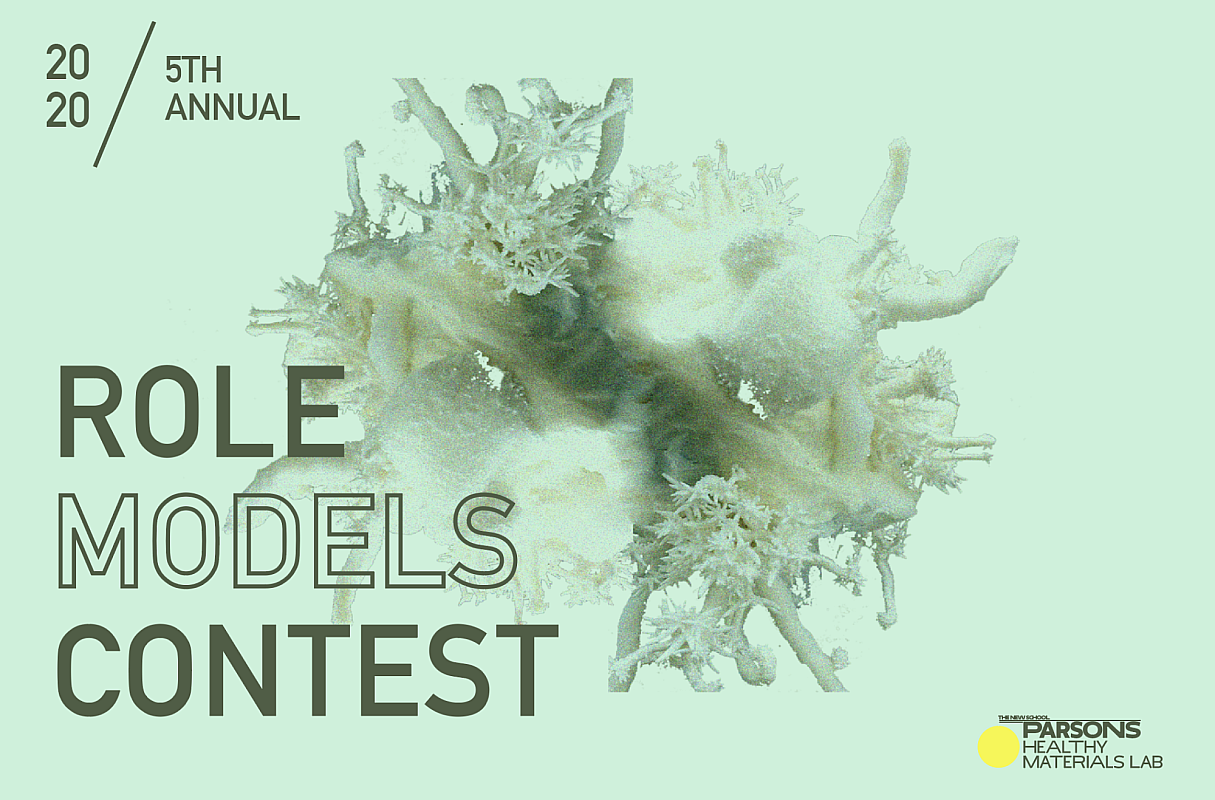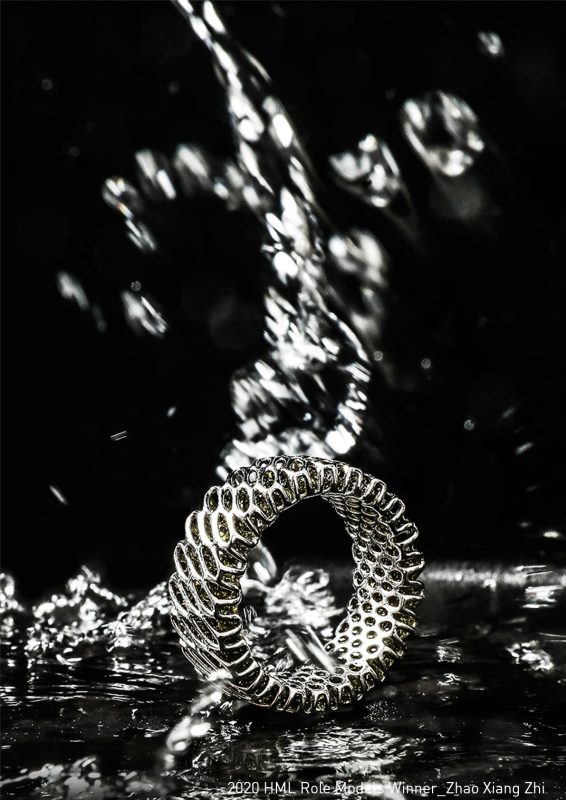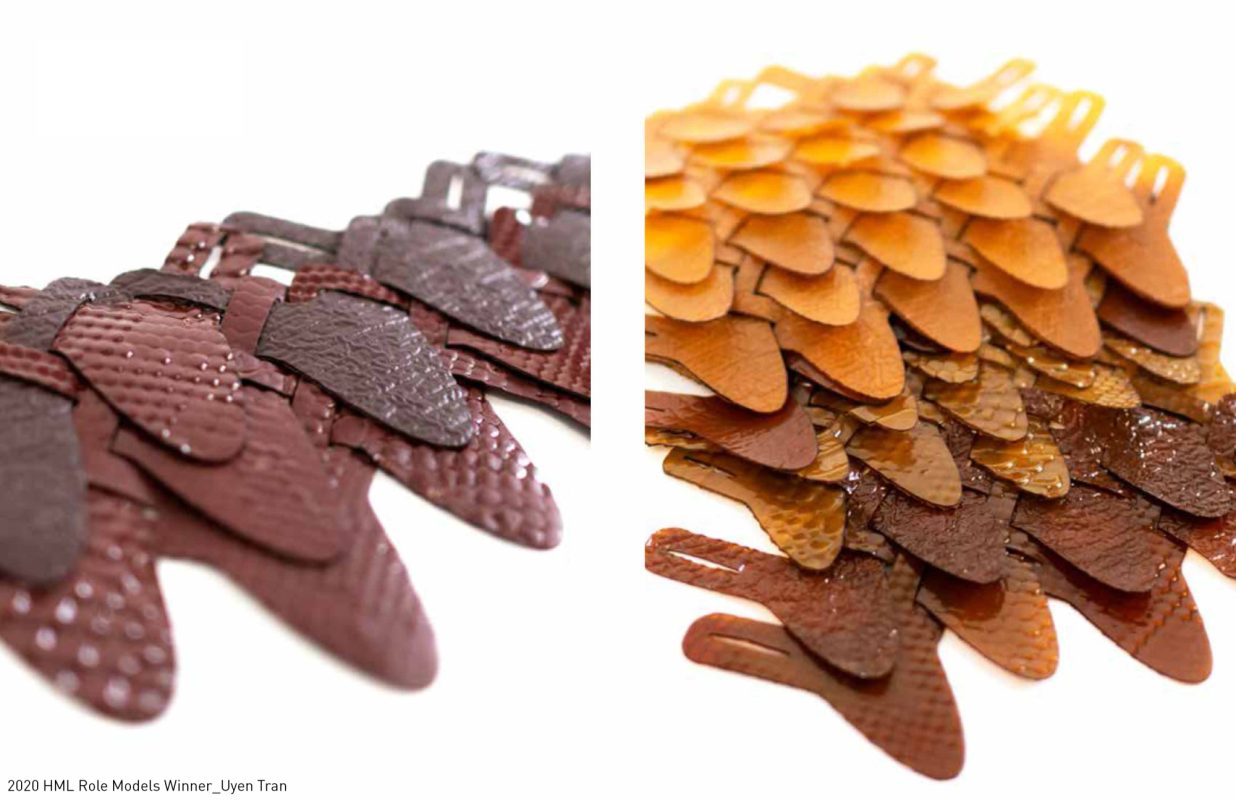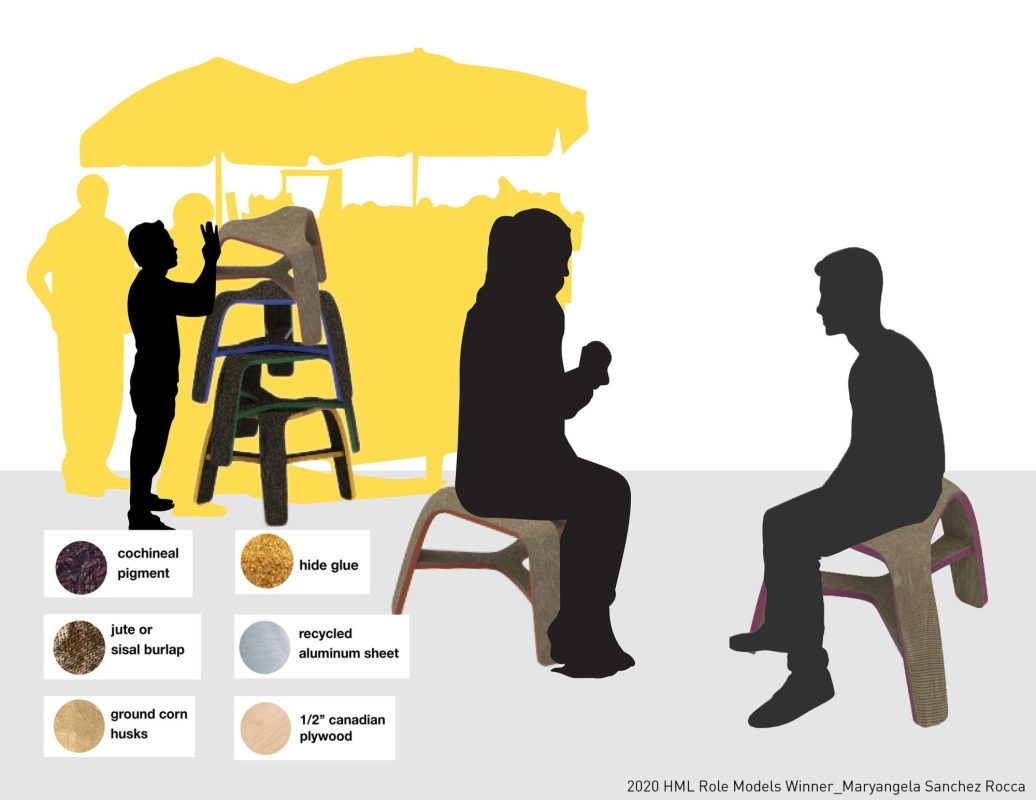In Spring 2020, Parsons Healthy Materials Lab hosted the fifth annual Role Models Contest. This annual design contest offers a chance for students to be a “Role Model” to the design world by proposing an innovative approach to design combined with a demonstration of how creative practice can have a positive impact on personal health, the health of our neighbors, and the world at large. The semester was marked by the onset of the COVID 19 pandemic, causing worldwide disruptions to everyone. We acknowledge the challenges confronting students and celebrate their ability to continue to design in the midst of immense hardship.

For the first time, we were excited to be able to extend the contest to enrolled students internationally. This year we received submissions from twenty-two universities in seven countries including China, Saudi Arabia, and Zimbabwe. Anonymous submissions were judged based on the following criteria:
- Clear argument for positive health impact and environmental benefit
- Clear Motivation for Material Choice
- Demonstration of Innovation and Future Thinking
- Demonstration of Carbon Impact
- Compelling Aesthetics
- Materials Transparency
Because of the large number of excellent submissions, we awarded three winners and three honorable mentions – all of whom exemplified the innovative use of healthy materials to provide design innovations for social and environmental issues.
Congratulations to this year's winners!
First Prize: Myco-Electronics for the Circular Economy





By Eldy Stephanie Lazaro Vasquez, UC Davis
Myco-Electronics uses mycelium-hemp boards as the material for non-conductive components of electronics, which make up a large part of the increasing e-waste problem. Although there have been significant design explorations into mycelium in design of various products, for example, this was an innovative and intriguing use of the material that has the potential to radically change the electronics industry which regularly utilizes flame retardant chemicals - this proposal eliminates the need for added flame retardants.
Aspects the judges loved:
- Mycelium hemp boards reduce chemical compounds and mined materials normally found in consumer electronics.
- Creates a compostable solution to e-waste.
- Uses the material of mycelium in an innovative way.
- Has the potential to change the electronics industry.
- The material has inherent flame retardant and heat resistant properties, reducing the need for added flame retardant chemicals.
- Creates a mycelium product which can be laser cut with the potential to be used in multiple applications.
Aspects the judges felt could be developed further:
- As is, this is more of a material exploration than a designed product.
- The submission did not document how the proposal might transform the electronics industry, or how they would suggest moving forward to implement their product.
Second Prize: Endangered Identity








By Jacob Olmedo, Parsons The New School
Endangered Identity is a wearable armor that uses bio-based isomalt beads with seeds encased in each bead. The piece tells a powerful story about cultural identity and climate change using several different craft techniques.
Aspects the judges loved:
- This is an aesthetically beautiful piece.
- Adopts several craft techniques including wool spinning, crocheting, beadwork.
- Uses craft to tell a story and to explore Indigenous history and identity.
- Utilizes biomaterial exploration using “isomalt”.
Aspects the judges felt could be developed further:
- Although seeds native to North America were chosen, this project could be more sustainable by becoming more regionally specific.
- With help from a horticulturist they could choose plants that are specific to local ecosystems.
Third Prize: Shellgae: A Home Compostable Bio-Polymer







By Nihaarika Arora, Parsons The New School
Shellgae uses algae polymers to create innovative and aesthetically provocative take-out containers. Although the use of bio-polymers as plastic replacements is not new, the design highlights the material usage in a compelling way.
Aspects the judges loved:
- Shellgae embraces it’s base material, showcasing the natural coloring and adopting new forms, rather than attempting to make the biopolymer similar to petrochemical plastic products.
- Detailed and well-researched material exploration.
- Both a useful product and one that extends a message.
- Addresses a significant problem of waste with a completely biodegradable replacement.
Aspects the judges felt could be developed further:
- Shellgae continues the culture of using single-use items, and as such continues the culture of disposability (even though this one is biodegradable without industrial composting).
- It was not clear from the project if the product might affect the taste of the food that is held.
Congratulations to this year's honorable mentions!
Morning Dew Regenerated Ring

By Zhao Xiang Zhi, Beijing Normal University
Morning Dew Regenerated Ring uses recycled e-waste to make a delicately designed piece of jewelry. E-waste and the mining of precious metals for electronics use are incredibly harmful to the environment. This ring reclaims the metal post-consumer use to create an object of value and a statement about which materials we choose to use and why.
Aspects the judges loved:
- The mining of precious metals is harmful to the environment and the people who work in the mines. Using e-waste instead of mined metals reduces risk.
- Aesthetically compelling piece which makes waste look valuable.
Aspects the judges felt could be developed further:
- The extraction process of precious metals from e-waste was not completely clear.
- The impacts for re-casting the metal into a new form are not clear.
Chito Leather: From Nature For Nature

By Uyen Tran, Parsons The New School
Chito Leather uses Chitosan, which is a material made from the shells of crustaceans, and coffee grounds to create a leather-like material. In the project, the Chito Leather was used to create various familiar but beautifully executed textures and shades.
Aspects the judges loved:
- The project is well presented and thoroughly researched.
- Chito Leather is used to create a variety of detailed and intricate textiles that have a high level of craft.
Aspects the judges felt could be developed further:
- Many of the textile pieces are made to imitate the aesthetic of faux-animal skin, which uses an unsustainable material as a design aesthetic.
- The Chitosan ingredients are commercially sourced, and the process of production was not disclosed which makes the product development less transparent.
Tamalli

By Maryangela Sanchez Rocca, Parsons The New School
Tamalli is a stool made primarily of ground corn husks and jute burlap designed to replace the ubiquitous plastic chairs that are given to food vendors by large corporations like Coca-Cola. The motivation behind the design is to localize the production of these products, which are so often shipped globally and replace the item which is typically made from petrochemicals.
Aspects the judges loved:
- The entire chain of production is local.
- A regional and bio-based solution to a ubiquitous problem.
Aspects the judges felt could be developed further:
- The stools are low and do not have armrests which raises accessibility concerns for some populations.
- The aesthetics could use further development.
- Stack-ability needs further design development.
Role Models 2020 Jury
Parsons Healthy Materials Lab’s co-directors Alison Mears and Jonsara Ruth were joined by an esteemed jury from the design world:
- Aaron Dorf, Director and Senior Architect, Snøhetta
- Andrea Lipps, Associate Curator of Contemporary Design, Cooper Hewitt, Smithsonian Design Museum
- Chris Scoates, Nanette L. Laitman Director, Museum of Arts and Design
- Garrett Benisch, Industrial Designer. Founder, Sum Studio
- Marybeth Shaw, Chief Creative Officer, Design + Marketing, Wolf-Gordon
- Odile Hainaut, Co-Founder, WantedDesign
- Susan Yelavich, Professor Emerita, Design Studies, Parsons School of Design, The New School
Read More
Join Our Academic Network
Get Access to our carefully researched and curated academic resources, including model syllabi and webinars. An email from an academic institution or a .edu email address is required. If your academic institution does not use .edu email addresses but you would like to join the network, please contact healthymaterialslab@newschool.edu.
Already have an account? Log in